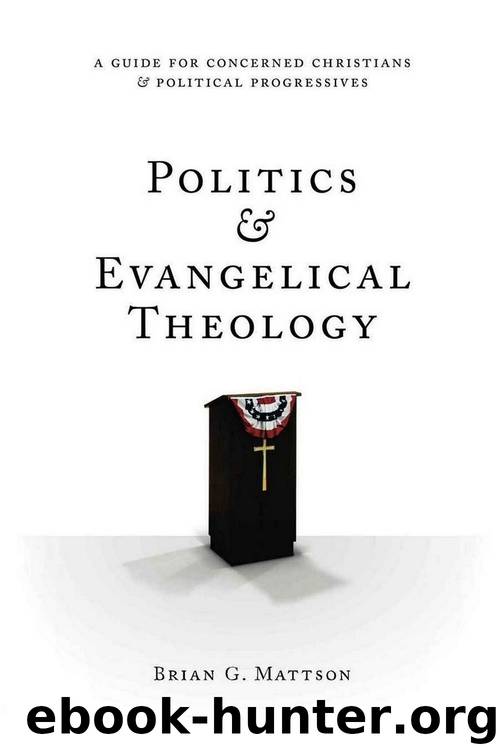Politics & Evangelical Theology: A Guide for Concerned Christians and Political Progressives by Brian G. Mattson

Author:Brian G. Mattson
Language: eng
Format: mobi
ISBN: 9781477566213
Publisher: CreateSpace Independent Publishing Platform
Published: 2012-06-22T00:00:00+00:00
CHAPTER FIVE: ON PRIVATE PROPERTY
Daniel Suelo lives in a cave outside of Moab, Utah.[86] Born in 1961 as Daniel James Shellabarger, a decade ago he renounced wealth, gave away his last cent, and wandered into the hills. He doesn’t believe in possessions. He owns nothing. He doesn’t work. He doesn’t make money. Money is evil: “When I lived with money, I was always lacking. Money represents lack. Money represents things in the past (debt) and things in the future (credit), but money never represents what is present.”
Profound stuff.
Mr. Suelo is the latest in a long historical line of fringe ascetic pilgrims who renounce private property. What is interesting is that he claims Christianity as an inspiration. For him, the Sermon on the Mount demands his lifestyle: “Giving up possessions, living beyond credit and debt, freely giving and freely taking, forgiving all debts, owing nobody a thing, living and walking without guilt […] grudge, or judgment.” Of course, one finds little, if any, of those things in the Sermon on the Mount, but we can give him a pass on that—after all, the poor guy doesn’t own a Bible.
He actually got his inspiration from the Eastern religions, Hinduism and Buddhism. After living for a time in a Buddhist monastery in Thailand, he wandered to India, where he joined company with an entire group of penniless ascetics, the “sadhus.” Suelo wanted to be a sadhu, but decided that it was not challenging enough: “A true test of faith would be to return to one of the most materialistic, money-worshipping nations on earth and be a sadhu there. To be a vagabond in America, a bum, and make an art of it—the idea enchanted me.” And so he did.
This brings it into proper focus. It is a fundamental feature of the “monistic” or “collectivist” religions like Hinduism and Buddhism (e.g., “all is one”) that stuff is the basic problem. Material possessions are what cause greed and envy. If we could just overcome our attachment to things then we would be at peace with ourselves, each other, and the divine. We will be a “brotherhood of man / sharing all the world,” as a nauseating song puts it. (I’m not sure which is more nauseating: the song or its popularity?) The messy material world needs to be transcended or overcome—a peaceful utopia can only be achieved if we get rid of money, or at least the inequality money represents. Daniel Suelo thinks he is channeling the spirit of Jesus.
He is channeling the spirit of Karl Marx.
This chapter is very simple, and can be summed up in an easily memorized sentence: The Bible teaches the right of individual private property. Material possessions, stuff, or things are not the roots of human dysfunction. Humanity’s problem is an ethical one, not a material one. Utopia will not be achieved if the happy time arrives, as in John Lennon’s fevered imagination, when there are “no possessions.” That’s what the ancient Gnostics thought and modern-day Gnostics like Daniel Suelo still think.
Download
This site does not store any files on its server. We only index and link to content provided by other sites. Please contact the content providers to delete copyright contents if any and email us, we'll remove relevant links or contents immediately.
| Africa | Americas |
| Arctic & Antarctica | Asia |
| Australia & Oceania | Europe |
| Middle East | Russia |
| United States | World |
| Ancient Civilizations | Military |
| Historical Study & Educational Resources |
German, Jew, Muslim, Gay by Marc David Baer(994)
Letters to a Young Contrarian by Christopher Hitchens(959)
American Prophets by Jack Jenkins(847)
Unholy by Sarah Posner(721)
Shapiro, Ben - The Right Side of History by Shapiro Ben(691)
M31 by Stephen Wright(655)
The End of Empathy by John W. Compton(637)
Sacred Causes by Michael Burleigh(606)
Jihad & Co. - Black Markets and Islamist Power by Aisha Ahmad(592)
ERADICATE - Blotting Out God in America by Fiorazo David(555)
The Theft of America's Soul by Phil Robertson(553)
Atheist Universe by David Mills(549)
Sacred Liberty by Steven Waldman(526)
The Family by Sharlet Jeff(516)
The Jefferson Bible - Life And Morals Of Jesus Of Nazareth by Thomas Jefferson(490)
C Street by Jeff Sharlet(489)
Religion and Power by Martin David(489)
Beyond Terror: Islam's Slow Erosion of Western Democracy by Anne Marie Waters(488)
Divinity of Doubt by Vincent Bugliosi(480)
